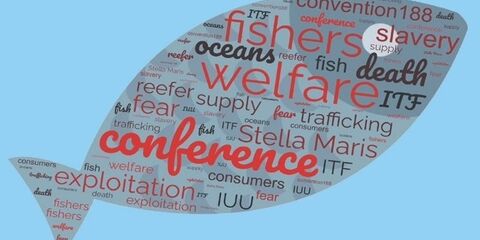Taiwan International Conference on Fisher’s Welfare

With over 100,000 annual fatalities among fishers across the world, two thirds of fishers citing exploitation and as many as 9% of fishers in modern slavery, workers in the fishing industry are in clear and urgent need of support, a commitment to workers’ rights and regulatory enforcement.
While fishing is often dangerous work, delegates at the international conference on fisher’s welfare between 13-17 May in Taiwan’s second city Taichung heard that regulation and enforcement were lacking in an often lawless industry. The absence of robust data gathering and fishers’ inability to communicate effectively with family and those groups that would support their welfare were preventing more effective oversight on fisher’s welfare. This made investigation of abuse, exploitation and patterns of criminality extremely difficult in the absence of testimony and data.
Conventions to protect and promote fishers’ rights, such as the International Labour Organisation’s C118, have not been consistently adopted or enforced. Speakers from the International Transport Workers’ Federation criticised the lack of action in enforcing workers’ rights and those countries who complacently stated that progress was being made, stating that after 105 years since the ILO was set up 105 years ago, the only answer to ‘where are we now?’ is ‘nowhere’. Meanwhile the hidden nature of exploitation and abuse of fishers as it occurs off-shore allows criminality to continue.
Despite the difficulties in combatting the extensive lawlessness and exploitation in the fishing industry, delegates heard of the Church’s commitment to fishers. This support is shown through Stella Maris and the Scalabrini Religious order who offer chaplaincy support in ports and are often first responder to fishers’ needs, but also the Church’s commitment to the most vulnerable.
Cardinal Stephen Brislin, president of Santa Marta Group Africa, reminded the conference, in a keynote address, of the importance of upholding the human rights of all.
“As Pope Francis says, there appears to be a changing definition of human rights and they are being degraded. All human rights are connected and they must all be upheld… we need to re-discover our humanity; we need a new humanism, where human dignity is at the centre.
“We need to see workers not as commodities but rather as individual persons made in the image and likeness of God who strive for agency over their own lives, the means to support their families and themselves with dignity,” said Cardinal Brislin.
Bishop Ruperto, bishop promoter of Stella Maris in the Philippines, said the church’s concern for the people of the sea was about communion and justice.
“Most of all people of the sea want our presence. Our presence is vital, and then our actions to help them,” said Bishop Ruperto.
Kevin Hyland, Santa Marta Group strategy director, put the struggle for fishers’ rights and an end to slavery on the seas in the context of the wider phenomenon of human trafficking and modern slavery across the world. He took delegates through the Santa Marta strategic plan which seeks to end slavery by building partnerships between Church leaders and leaders at police, business and State level. At the heart of this plan is the responsibility of all to hold Countries and their government agencies to account in fulfilling their stated international commitments to end slavery.
Indonesian fishers’ representatives said workers were looking for solutions now; not 12 months later when fishers had returned home. The needs were simple: contact with family when at sea; healthcare provision; access to food and clean water; access to legal representation. Furthermore all solutions should be produced in conjunction with fishers so they had the tools to ensure their rights and offer them improved protection.
Solutions proposed include the provision of WiFi onboard each fishing vessel to enable easy communication with family and emergency services when needed; installation of CCTV onboard; a hotline service for fishers; improved data collection; enforcement of international conventions and directives.
A working group has been set up to take forward some of the proposed solutions, focusing particularly on the need for reliable data so patterns of abuse and exploitation could be established and the necessary action taken.
A note of optimism was sounded in research from Australia, which found that almost 50% of young people believed human trafficking and modern slavery was the number one issue that needed addressing today.
Bishop Martin Su, bishop promoter of Stella Maris Taiwan and the bishop of Taichung who hosted the conference thanked the 130 delegates from across the world for participating. Most of all, Bishop Su thanked Stella Maris, the Scalabrini International Migration Network, the ITF and the Taiwanese ministries involved in the conference and all those who seek to improve and uplift the dignity and condition of seafarers and the welfare of migrant fishermen.
For a detailed scheduled of the conference and speeches held, click here.